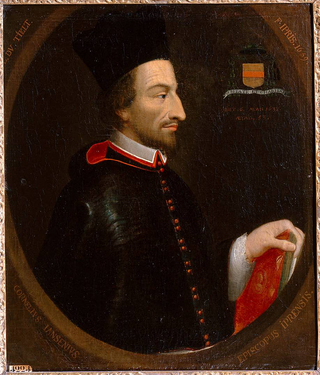
Pope Alexander VII, born Fabio Chigi, was head of the Catholic Church and ruler of the Papal States from 7 April 1655 to his death, in May 1667.

Jansenism was an early modern theological movement within Catholicism, primarily active in the Kingdom of France, that arose in an attempt to reconcile the theological concepts of free will and divine grace. Jansenists claimed to profess the true doctrine of grace as put forth by Augustine of Hippo. In 1653, Pope Innocent X promulgated the bull Cum occasione, which condemned five errors attributed to Jansenism, including the idea that Christ did not die or shed his blood for all men.

Cornelius Jansen was the Dutch Catholic bishop of Ypres in Flanders and the father of a theological movement known as Jansenism.

Antoine Arnauld was a French Catholic theologian, philosopher and mathematician. He was one of the leading intellectuals of the Jansenist group of Port-Royal and had a very thorough knowledge of patristics. Contemporaries called him le Grand to distinguish him from his father.

Pasquier Quesnel, CO was a French Jansenist theologian.
Unigenitus is an apostolic constitution in the form of a papal bull promulgated by Pope Clement XI in 1713. It opened the final phase of the Jansenist controversy in France. Unigenitus censured 101 propositions of Pasquier Quesnel as:
false, captious, ill-sounding, offensive to pious ears, scandalous, pernicious, rash, injurious to the Church and its practices, contumelious to Church and State, seditious, impious, blasphemous, suspected and savouring of heresy, favouring heretics, heresy, and schism, erroneous, bordering on heresy, often condemned, heretical, and reviving various heresies, especially those contained in the famous propositions of Jansenius.

Exsurge Domine is a papal bull promulgated on 15 June 1520 by Pope Leo X. It was written in response to the teachings of Martin Luther which opposed the views of the Catholic Church. The bull censured forty-one propositions summarised from Luther's writings, and threatened him with excommunication unless he recanted within a sixty-day period commencing upon the publication of the bull in Saxony and its neighboring regions.

The Lettres provinciales are a series of eighteen letters written by French philosopher and theologian Blaise Pascal under the pseudonym Louis de Montalte. Written in the midst of the formulary controversy between the Jansenists and the Jesuits, they are a defense of the Jansenist Antoine Arnauld from Port-Royal-des-Champs, a friend of Pascal who in 1656 was condemned by the Faculté de Théologie at the Sorbonne in Paris for views that were claimed to be heretical. The first letter is dated January 23, 1656 and the eighteenth March 24, 1657. A fragmentary nineteenth letter is frequently included with the other eighteen.

Augustinus seu doctrina Sancti Augustini de humanae naturae sanitate, aegritudine, medicina adversus Pelagianos et Massilianses, known by its short title Augustinus, is a theological work in Latin by Cornelius Jansen. Published posthumously in Louvain by Jacobus Zegers in 1640, it was in three parts:
- On Pelagianism
- On original sin
- On divine grace
Heinrich Joseph Dominicus Denzinger was a leading German Catholic theologian and author of the Enchiridion symbolorum et definitionum, a work commonly referred to simply as Denzinger after him.
The formulary controversy was a 17th- and 18th-century Jansenist refusal to confirm the Formula of Submission for the Jansenists on the part of a group of Catholic ecclesiastical personnel and teachers who did not accept the charge that their beliefs about the nature of man and grace were heretical as the Holy See declared. In the Kingdom of France, it pitted Jansenists against Jesuits. It gave rise to French theologian Blaise Pascal's Lettres provinciales, the condemnation of casuistry by the Holy See, and the dissolution of organised Jansenism.
Martin de Barcos (1600–1678), was a French Catholic priest and theologian of the Jansenist School.
Nicolas Cornet was a French Catholic theologian.
Vineam Domini Sabaoth is an apostolic constitution in the form of a papal bull promulgated by Pope Clement XI in 1705 which declared that "obediential silence" is not a satisfactory response to the Formula of Submission for the Jansenists.
The term dogmatic fact is employed in the teaching of the Catholic Church, to mean any fact connected with a dogma, wherein the application of the dogma is itself what constitutes, or more accurately canonizes, the fact.

The Old University of Leuven was established in 1425 with Faculties of Arts, Medicine, Law; however, the university did not have a Faculty of Theology initially. In 1426 a Faculty of Canon Law was added, and at that time both Law Faculties functioned together in one Collegium utriusque iuris.
Regiminis Apostolici is an apostolic constitution in the form of a papal bull promulgated by Pope Alexander VII in 1665 which required, according to the Enchiridion symbolorum, "all ecclesiastical personnel and teachers" to subscribe to an included formulary, the Formula of Submission for the Jansenists:
I, N., submit to the apostolic constitution of the Supreme Pontiff Innocent X dated May 31, 1653, and to the constitution of the Supreme Pontiff Alexander VII dated October 16, 1656, and, with a sincere heart, I reject and condemn the five propositions taken from the book of Cornelius Jansen entitled Augustinus and in the sense understood by that same author, just as the Apostolic See has condemned them by the two above-mentioned constitutions, and I so swear: So help me God, and these holy Gospels of God.
Cum occasione is an apostolic constitution in the form of a papal bull promulgated by Pope Innocent X in 1653 which condemned five propositions said to have been found in Cornelius Jansen's Augustinus as heretical.

Anthonius Triest, was the fifth bishop of Bruges and the seventh bishop of Ghent.
Johannes van Santen served as the fourteenth Archbishop of Utrecht from 1825 to 1858. He was part of the last attempt of the Church of Utrecht to reconcile with the Roman Catholic Church at that time.









